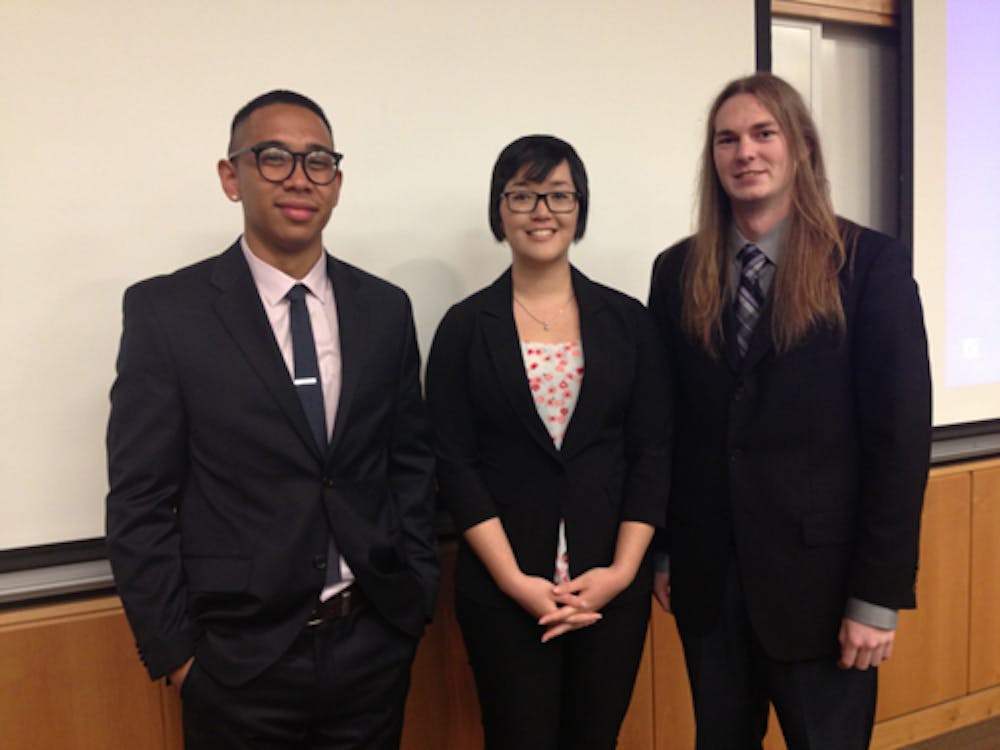4. From left to right (Ana Fonseca | THE BEACON)
By Ana Fonseca, Staff Writer fonsecaa16@up.edu
On Founders Day, classrooms across campus filled with senior presenters who shared their final projects, a year's-worth of hard work, with peers, faculty, staff and donors. Seniors from all departments used the skills they gained at UP to tackle some of the questions and challenges posed within their disciplines.
Computer Science
Computer science majors Kekai Ariola, Eric Bergquist and Megan Yamatoto formed Team Hopworks, which set out to update another senior's capstone project from last year, Advise UP - a web-based scheduling application meant to aid the student advising process at UP.
The purpose of the Advise UP app is to allow students and advisors to work together to create an academic schedule on an online platform that saves the schedule for later use.
A student's schedule and all the courses necessary to graduate are on an online template, allowing them to move things around and plan their schedules or clear transcript errors. Advise UP would potentially save time for advisers and students.
In their presentation, Team Hopworks performed a quick sketch of a student-adviser meeting and demonstrated the application. They explained the technical details and some of the kinks still needed to be worked out.
The new version used data from the University database and was tested by students. Forty - five students tried the Advise UP app. They rated the app 3.63 on the usability scale, with five being the easiest. Ninety-three percent of them said they would use the application to plan their academic schedules.
"One of the more rewarding aspects of the project was seeing that people would actually want to use it, after we put all the work into it," Ariola said. "We just hope that it will be used next year."
Brian Toole, industry adviser, UP SQL Applications Specialist and UP alum, said the work the students put into this app is similar to the work they will do in the future.
"It's about helping them experience what I, and my fellow co-workers, experience regularly," Toole said. "It's not just what you learn in the classroom. That's a good basis, but the experience they've had is very close to what they'll get after graduation."
Team Hopworks said the application could potentially be picked up by UP but would need to be updated.
History
History major Amanda Pilcher examined the American Civil War and how it affected women's roles. Her thesis won the Rev. Erwin Orkiszewski, C.S.C., Senior Thesis Award in History.
"I feel incredibly honored to have gotten the award," Pilchard said. "I think it's one of my, if not the biggest accomplishments I've gotten at UP."
Pilcher said she chose her topic because there was limited information on women's rights and roles during the Civil War.
"I wanted to see if coming out of the home, because I knew that there were a lot more nurses, was kind of a hub of the women's movement," Pilcher said. " [It] was a lot more complex than women just saying, 'I want equality.'"
Through her research, Pilcher concluded that the Civil War allowed women to move out of the home, articulate their ideas and put them into action.
Staff adviser and history professor Christin Hancock said the thesis project allows students to do the work historians do.
"What we're asking of them is to do their own individual primary source research, analyze the sources and place them in a historical context. And then they have to make a historical claim," Hancock said. "Amanda's project makes an excellent contribution to both Civil War history and American women's history."
Pilcher said her senior thesis allowed her to refine her skills and gain valuable experience.
"It furthered my interest in one day becoming a history professor," Pilcher said.
Environmental Science
Two student groups, a mix of environmental science, biology, and environmental ethics and policy majors came together and used their different strengths to wrestle with some of the environmental conflicts in the Columbia River Estuary.
The first group examined the conflicts resulting from the listing of the marbled murrelet bird as a threatened species. The marbled murrelet nests in old-growth forests that have trees ideal for logging. The major threat to the birds, which are dwindling in numbers, is a conflict of interest with the logging industry.
Environmental science major Hilary Akers and biology major Keenan Moore focused on the biological factors, while environmental ethics and policy majors Molly Johnson and Sarah Fitzgerald delved into the political factors surrounding the conflict.
"We wanted to work on something that was still an ongoing issue," Johnson said.
The second group studied the conflicts between sea lions and their consumption of salmon in the Bonneville Dam. Steller and California sea lions are eating Chinook salmon, but both are federally protected species under the Endangered Species Act.
Collaboration between disciplines played a significant role because the groups made biological and political assessments. Environmental science majors Evan Fessler and Carolyn Forsyth worked closely with biology major Alyssa Oue and environmental ethics and policy majors Eric Nettleton, Ashley-Nicole Vanderford and Mario Rios.
The group addressed what they thought was the most ethical resolution to this conflict.
"It's a very touchy issue, so sometimes people will only touch it with a ten-foot pole," Fessler said.
They decided that removing and hazing California sea lions was the best option for protecting Chinook salmon. Although this may not be a favorable opinion, they were most concerned with bringing awareness to people.
"Giving people the perspective of the issue and getting all the perspectives can really open people's minds to how important these issues are," Fessler said.
The team's staff adviser, biology professor Steve Kolmes, said the project helped students know what to expect of their career field.
"This more or less mirrors for them the team they're going to find themselves a part of when they're working in the real world," Kolmes said.
1. From left to right (Stephanie Matusiefsky | THE BEACON)
3. Senior Molly Johnson. (Stephanie Matusiefsky | THE BEACON)
2. Senior Amanda Pilcher. (Stephanie Matusiefsky | THE BEACON)








